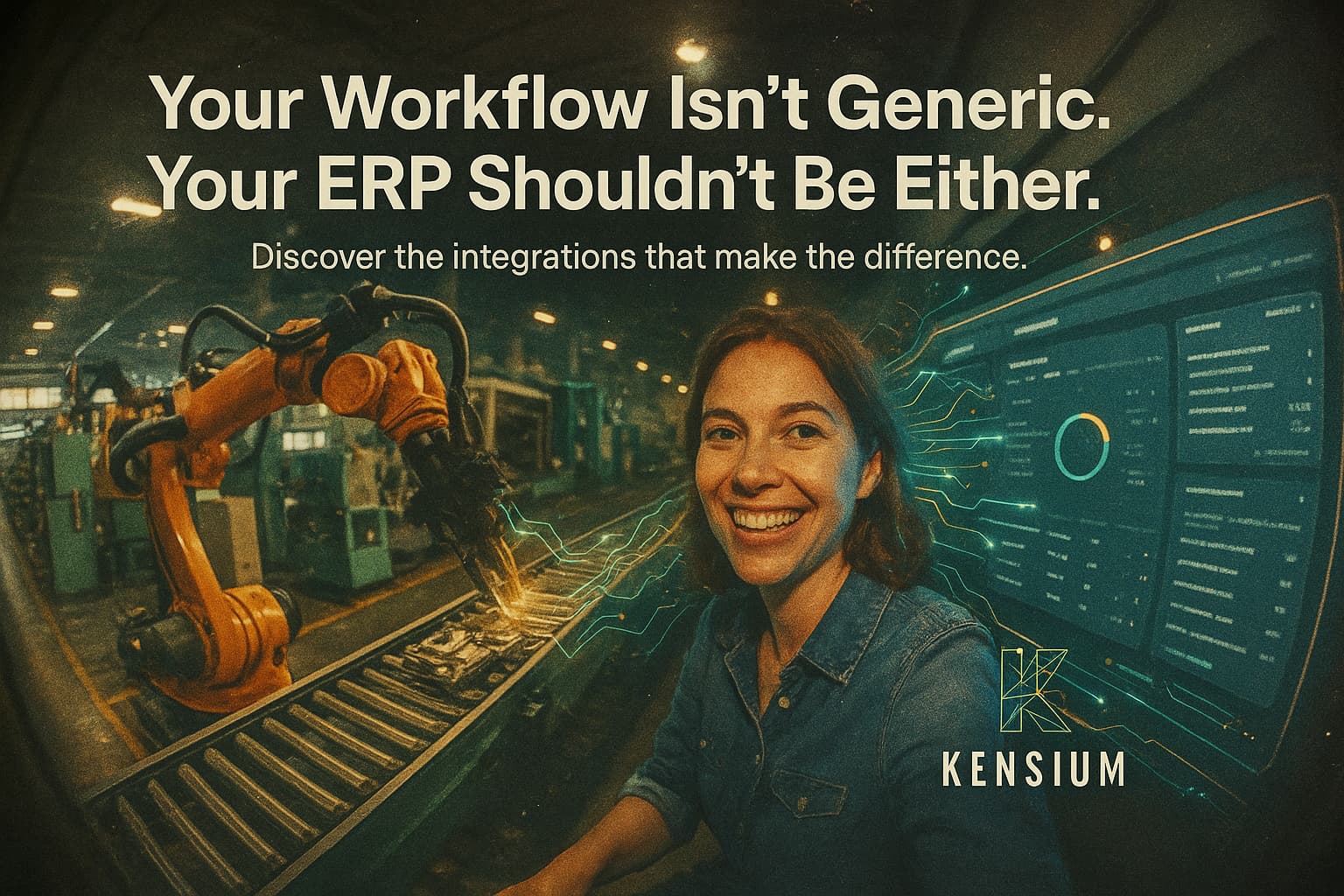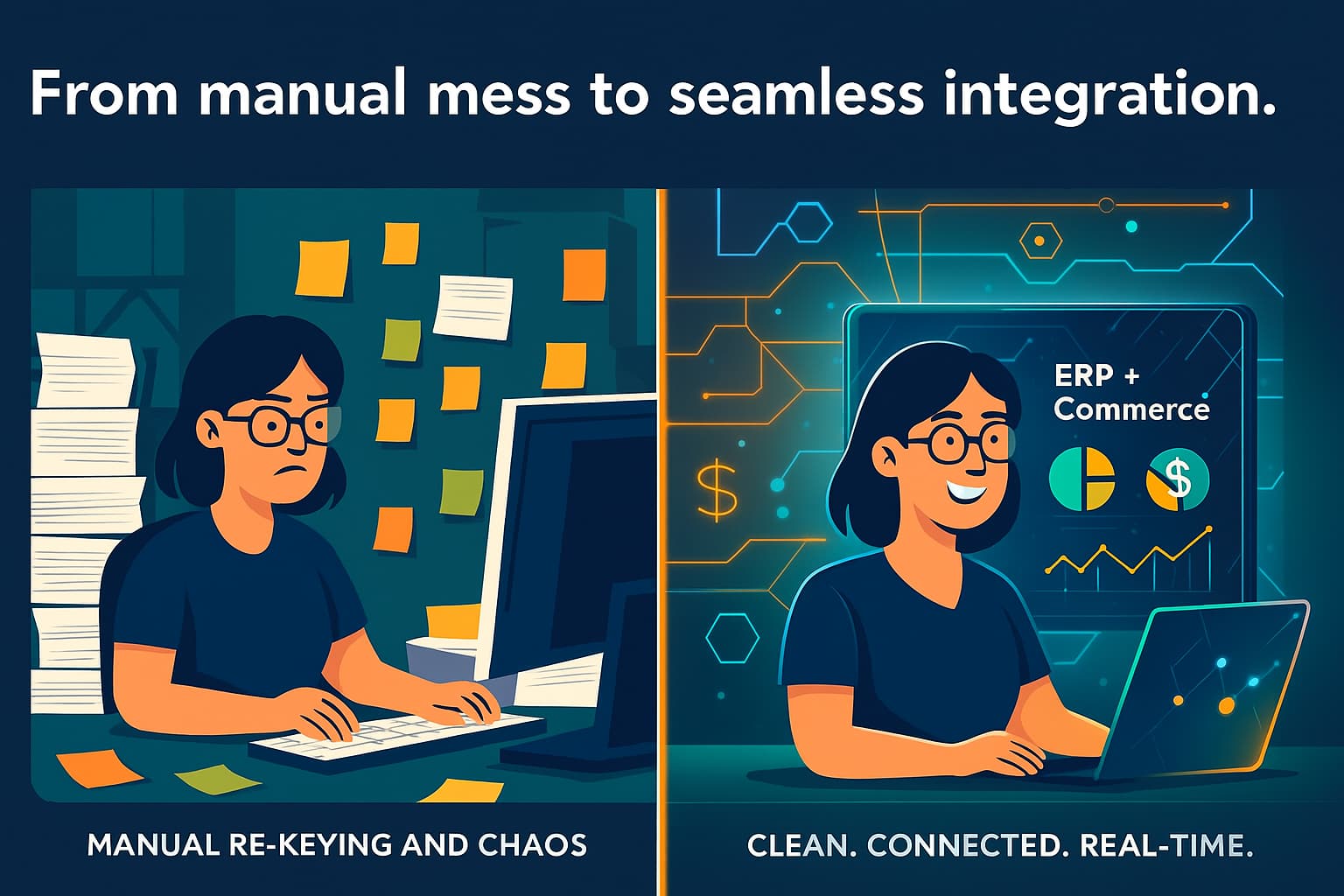
In today's dynamic market, businesses are shifting away from standalone systems. Instead, the integration of ERP and ecommerce solutions has become essential for achieving operational excellence and delivering seamless customer experiences. For Value-Added Resellers (VARs), distributors, and manufacturers, leveraging integrated systems isn’t just an option—it’s a strategic imperative. In this post, we explore industry trends, share actionable insights backed by data, and explain why partnering with an expert like Kensium can propel your business forward.
Embracing the Era of Integrated Commerce
The digital transformation of business operations is well underway. Traditional ERP systems and ecommerce platforms are converging to break down silos and drive efficiency. Modern buyers demand systems that are agile, responsive, and fully connected. In fact, research shows that 73% of B2B buyers prefer companies with robust ecommerce capabilities. This statistic underscores a market shift where digital integration directly influences purchasing decisions.

When companies integrate ecommerce with ERP, they enjoy benefits such as real-time data synchronization, reduced manual errors, and a unified view of operations. According to an article on Nucleus Research, Features and Importance, businesses with integrated solutions report an average benefit of $7.23 returned for every dollar spent. These improvements not only enhance operational efficiency but also significantly boost revenue.
The Competitive Advantage of Seamless Integration
Integrated ERP and ecommerce solutions empower businesses with agility and precision. They allow companies to manage inventory, pricing, and customer engagement from a single platform. For instance, real-time data updates help prevent overselling, streamline supply chains, and ensure accurate reporting—all essential in a fast-paced business environment.
Moreover, 60% of mid-market organizations consider ecommerce integration a top priority when choosing an ERP provider. This statistic highlights that seamless integration is not just a technological upgrade but a crucial competitive differentiator. In a market where every second counts, the ability to quickly adapt and respond to customer needs is invaluable.
Actionable Strategies for Boosting Sales Through ERP-Ecommerce Integration
Here are five proven strategies that businesses can implement to maximize the potential of their ERP and ecommerce integration:
- Automate Order Management
ERP systems can automate order processing, allowing for faster fulfillment and reduced manual errors. By syncing the inventory levels with the ecommerce store, businesses can ensure that stock is updated in real-time, preventing overselling and stockouts. Automated invoicing, shipping, and notifications also ensure a smooth customer experience, improving loyalty and satisfaction.
Strategy Tip: Set up automatic reorder points within your ERP to trigger restocking based on demand trends, ensuring inventory levels are always aligned with sales.
- Personalized Pricing & Discounts
Integrated ERP systems can help businesses deliver personalized pricing based on customer profiles, order volumes, or contract terms. This is particularly beneficial for B2B companies that offer tiered pricing or bulk discounts. By integrating customer data with the ecommerce platform, you can automatically apply the right pricing, offers, and discounts at checkout.
Strategy Tip: Use your ERP to track customer behavior and sales history, tailoring discounts and offers for repeat customers to increase their lifetime value.
- Predictive Inventory Management
One of the standout benefits of ERP systems is their ability to predict inventory needs using AI and machine learning algorithms. With integrated ecommerce, businesses can forecast demand based on historical data and seasonal trends. This strategy helps optimize inventory levels, prevent stockouts, and reduce carrying costs.
Strategy Tip: Integrate your ERP system with your ecommerce platform's analytics to analyze customer demand patterns and make proactive inventory adjustments.
- Customer Data Unification
Integrated systems consolidate customer data from both ecommerce platforms and ERP, providing businesses with a 360-degree view of their customers. This unified data allows for better customer segmentation, targeted marketing, and personalized sales efforts. When businesses understand customer preferences and buying behaviors, they can offer more relevant recommendations and tailored experiences.
Strategy Tip: Leverage data analytics in your ERP to segment customers and target them with personalized product recommendations and promotions on your ecommerce platform.
- Streamlined Multi-Channel Selling
Selling across multiple platforms such as Amazon, eBay, and Shopify can lead to complex inventory management challenges. Integrated ERP systems solve this by centralizing stock levels and ensuring consistency across channels. Additionally, having a single platform for processing orders, managing pricing, and tracking shipments helps businesses provide a unified and consistent customer experience.
Strategy Tip: Use your integrated ERP system to monitor and adjust pricing and inventory across multiple channels in real-time to avoid discrepancies and maintain a competitive edge.
Overcoming Integration Challenges with Strategic Expertise
While the benefits are clear, integrating ERP with ecommerce platforms comes with its own set of challenges. VARs often encounter technical hurdles when linking disparate systems. Complex integration scenarios can lead to misaligned pricing models and fragmented data, undermining the benefits of integration. Additionally, the competitive pressures from established providers like NetSuite and Dynamics, known for their high costs and inflexibility, add to the challenge.
However, a strategic approach that focuses on deep technical expertise and customer-centric solutions can overcome these obstacles. For example, platforms like Acumatica have leveraged an open, flexible architecture to facilitate seamless integration. As detailed in NetSuite’s 60 Critical ERP Statistics, legacy systems are often too rigid to support the evolving demands of integrated commerce. By choosing solutions designed for the digital age, VARs can transform these challenges into opportunities for growth.
Why Kensium is Your Trusted Partner
In this evolving landscape, Kensium stands out as a leader. As a 5-time award-winning retail-commerce partner, Kensium brings proven expertise in merging ERP and ecommerce systems. Their end-to-end support—from pre-sales strategy to post-implementation assistance—ensures that every aspect of your integration is handled with precision.
Kensium’s collaborative co-selling model means that VARs benefit from a partnership that drives success without competing against them. Real-world case studies and success stories, such as those highlighted by Actindo in their guide on ERP for E-commerce, prove that businesses can reduce costs, streamline operations, and achieve impressive sales growth with the right integration strategy.
Turning Data into Opportunity

The numbers speak for themselves. When organizations embrace integrated commerce, they see:
- Enhanced operational efficiency due to real-time data synchronization.
- Significant revenue growth, with integrated systems driving a reported 25% boost in sales.
- Accelerated customer acquisition, as digital-first strategies attract and retain modern buyers.
For instance, Shopify’s resources on customer behavior analytics (Customer Analytics: How To Measure Customer Behavior) and big data in ecommerce (Big Data Ecommerce Explained) provide further evidence that data-driven strategies lead to measurable improvements in performance. Integrating these insights into your ERP system means making informed decisions that support long-term growth.
A Vision for the Future
As the market continues to evolve, the fusion of ERP and ecommerce will become the norm rather than the exception. The future belongs to businesses that can quickly adapt to changing customer demands, streamline their operations, and harness the power of real-time data. By aligning with experts like Kensium, you can stay ahead of the curve and transform integration challenges into competitive advantages.
Let’s Grow Together
Integrated commerce is not a luxury—it’s a necessity for businesses that want to thrive in today’s competitive environment. If you’re ready to accelerate sales, enhance operational efficiency, and deliver superior customer experiences, now is the time to act. Contact Kensium today and discover how our tailored ERP and ecommerce solutions can transform your business.








.png)





















































-small.jpeg)







